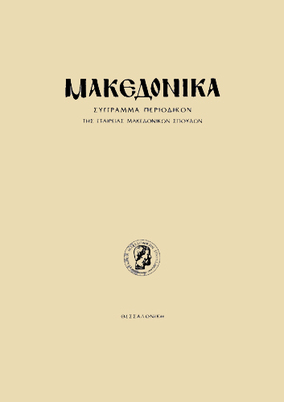Προσφυγικές εγκαταστάσεις στο Κιλκίς και την περιφέρεια του
Part of : Μακεδονικά ; Vol.32, 2000, pages 219-291
Issue:
Pages:
219-291
Parallel Title:
Refugee Settlements in Kilkis and the Surrounding Area
Section Title:
Articles
Abstract:
In political terms, during the period of Ottoman rule, Kilkis and its surrounding area constituted a kaza (administrative subdivision) called Avret Hisar (Gynaikokastro), which formed part of the sanjak of Thessaloniki, which in turn belonged to the vilayet of Thessaloniki. After the region was liberated it became an administrative division of the prefecture of Thessaloniki, consisting of the district of Kilkis and its two administrative subdivisions of Kato Theodoraki and Archangeloi. This study deals with the Greeks who abandoned their native lands and settled in the region of Kilkis as refugees after it was liberated from the Bulgarians in 1913. It describes the problems faced by the refugees in the first few years after their arrival, as well as their social and educational situation. The refugees who settled in the Kilkis region in 1914 came from Turkey, Russia (the Causasus) and Bulgaria. After the Treaty of Sèvres in 1920 almost all of the refugees returned to their homes. After the Asia Minor Disaster the signing of the protocol of Moudania in 1922 and the Treaty of Lausanne in 1923 forced the refugees to abandon their homelands for good and settle in Greece. At this time many refugees from Asia Minor and Eastern Thrace settled in the Kilkis region. These were followed, in 1925, by refugees from Eastern Rumelia. In recent times Greeks from the former Soviet Union have settled in Kilkis and the surrounding area. Despite the problems and difficulties they faced in the first few years, the refugees who settled in the Kilkis region remained undaunted. They engaged in various spheres of activity, especially commerce and education, with great success and preserved all the manners and customs they had brought with them from their homelands. At the end of the study there are a number of tables relating to the communities in which refugees settled in 1914, the damage suffered by the refugees’ fields during the First World War (1914-1918) and the state of the schools during the school year 1929-1930. A number of documents and photographs relating to the Kilkis region are also presented.
Subject (LC):
Notes:
856:https://ejournals.epublishing.ekt.gr/index.php/makedonika/article/view/5733, DOI: https://doi.org/10.12681/makedonika.172
Electronic Resources:




